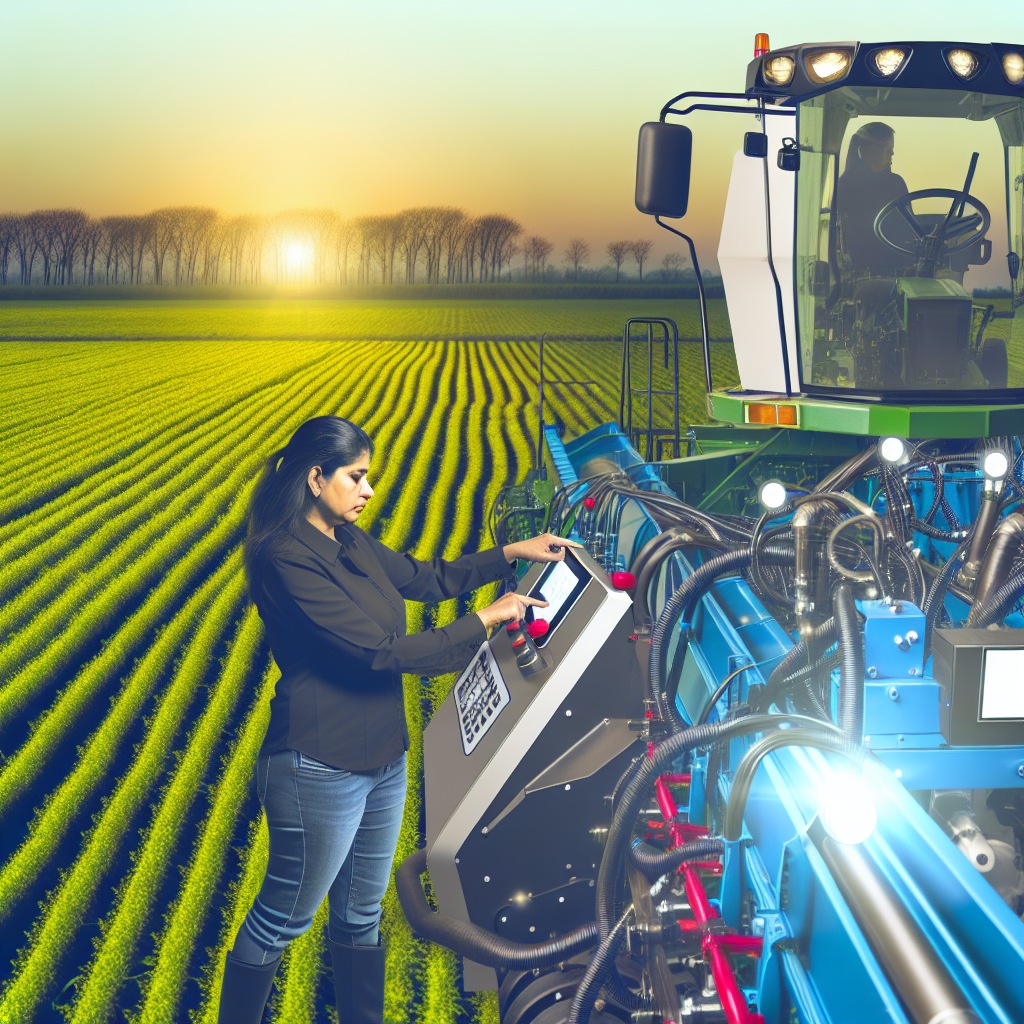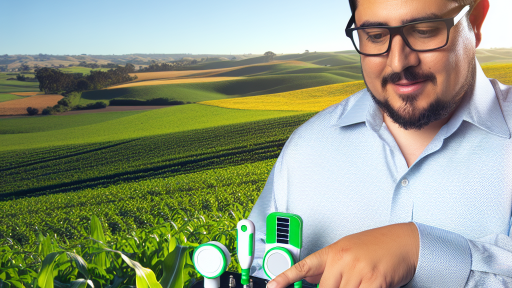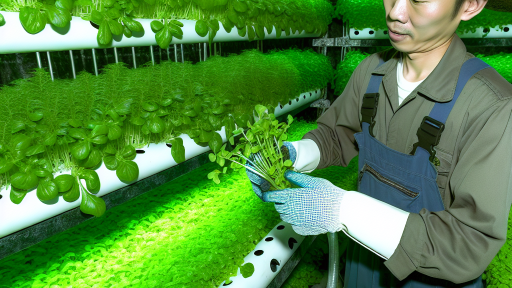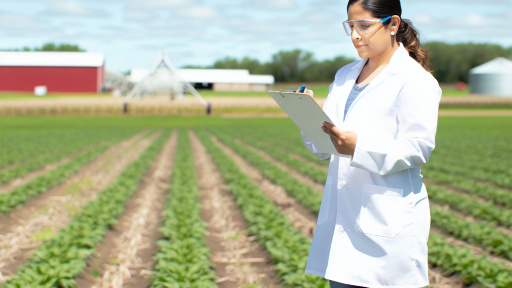Introduction to Precision Agriculture and the Role of Automation
Understanding Precision Agriculture
Precision agriculture focuses on optimizing field-level management.
This method uses technology to enhance crop yields and efficiency.
Farmers are adopting data-driven practices worldwide.
Consequently, they achieve more sustainable farming outcomes.
The Importance of Automation
Automation plays a critical role in precision agriculture.
It streamlines essential farming processes and tasks.
For example, automated machinery minimizes labor requirements.
This shift allows farmers to allocate resources more effectively.
Types of Automated Machinery
Various automated machines exist in the agricultural sector.
- Autonomous tractors can perform tasks without human intervention.
- Robotic harvesters enhance efficiency during harvesting seasons.
- Drone technology provides aerial imagery for precision mapping.
Benefits of Automation in Agriculture
Automation boosts productivity and reduces operational costs.
Additionally, it helps in making timely decisions based on data.
Ultimately, farmers can produce more food with fewer resources.
Types of Automated Machinery Used in Precision Agriculture
Tractors and Harvesters
Modern tractors have advanced automation features.
These machines now use GPS technology for precision navigation.
Automated harvesters increase efficiency during the picking process.
Transform Your Agribusiness
Unlock your farm's potential with expert advice tailored to your needs. Get actionable steps that drive real results.
Get StartedThey reduce labor costs significantly.
Farmers can schedule operations with greater accuracy.
Planters and Seeders
Automated planters ensure even seed distribution.
They adjust planting depth based on soil conditions.
Smart seeders monitor seed placement in real-time.
This technology enhances crop yield potential.
Farmers can customize planting patterns easily.
Irrigation Systems
Automated irrigation systems optimize water usage.
These systems respond to moisture levels in the soil.
Drip irrigation can be finely controlled for efficiency.
Automated systems reduce waste and increase crop health.
Farmers save time and resources with advanced technology.
Drones and Aerial Vehicles
Drones play a crucial role in crop monitoring.
They provide detailed aerial imagery for analysis.
Farmers can identify crop health issues rapidly.
This technology supports precise pesticide application.
Drones enhance overall agricultural productivity.
Autonomous Vehicles
Autonomous vehicles are transforming farming operations.
They perform tasks without human intervention.
These vehicles navigate fields using advanced sensors.
This reduces the need for manual labor in many areas.
Farmers can focus on strategic decision-making instead of routine tasks.
Benefits of Automated Machinery for Crop Management
Increased Efficiency
Automated machinery optimizes farm operations effectively.
It significantly reduces time spent on tasks like planting and harvesting.
Showcase Your Farming Business
Publish your professional farming services profile on our blog for a one-time fee of $200 and reach a dedicated audience of farmers and agribusiness owners.
Publish Your ProfileThis increased efficiency leads to higher productivity levels.
Farmers can cover large areas quickly using advanced machines.
Cost Reduction
Implementing automation leads to substantial cost savings.
Labor costs decrease since fewer workers are needed for operations.
Moreover, automation minimizes waste through precise application techniques.
In the long run, these savings contribute to improved financial stability.
Precision in Operations
Automated machinery excels in precision agriculture practices.
It allows for accurate seed placement and optimized fertilization.
This precision enhances crop yields and quality significantly.
Farmers can monitor and adjust processes in real-time efficiently.
Data Collection and Analysis
Automated systems facilitate extensive data gathering across fields.
This data can help track plant health and soil conditions effectively.
With advanced analytics, farmers make informed decisions quickly.
This capability enhances overall farm management strategies.
Environmental Benefits
Automated machinery reduces the need for chemical inputs.
It promotes responsible use of resources, benefiting the environment.
Furthermore, precision farming minimizes soil degradation risks.
Sustainability becomes more achievable through automation.
Explore Further: Benefits of Sensor Technology for Modern Farmers
The Role of Sensors and IoT in Automated Agricultural Systems
Introduction to Sensors in Agriculture
Sensors play a crucial role in modern agriculture.
They collect essential data about crops and soil conditions.
Furthermore, sensors enable real-time monitoring of agricultural practices.
Types of Sensors Used in Agriculture
Various sensors contribute to precision agriculture.
- Soil moisture sensors measure the water content in the soil.
- Temperature sensors monitor air and soil temperature.
- Weather stations provide data on climatic conditions.
Each type of sensor offers specific insights for farm management.
Integration of IoT in Agricultural Practices
The Internet of Things (IoT) enhances agricultural efficiency.
IoT connects various sensors and devices on the farm.
This connectivity facilitates data sharing in real-time.
Benefits of Using Sensors and IoT
Implementing sensors and IoT leads to multiple advantages.
- Farmers can make data-driven decisions.
- It reduces resource wastage and increases productivity.
- Moreover, it helps in predicting crop yields accurately.
Challenges in Implementation
Despite the benefits, challenges remain in sensor and IoT implementation.
Data privacy and security concerns can arise.
Additionally, the initial investment can be significant.
Future Trends in Agricultural Sensors
The future will see advancements in sensor technology.
Emerging technologies will further enhance data accuracy.
As a result, farmers can achieve even finer precision in agriculture.
Learn More: Sustainable Farming Practices Backed by Data
Case Studies of Successful Implementations of Automated Machinery
Introduction to Automated Machinery
Automated machinery is revolutionizing the agriculture sector.
Farmers are adopting these technologies to increase productivity.
Over the years, numerous case studies have highlighted their effectiveness.
Case Study of Green Fields Farm
Green Fields Farm implemented automated tractors in 2021.
These tractors utilize GPS technology for precise navigation.
Showcase Your Farming Business
Publish your professional farming services profile on our blog for a one-time fee of $200 and reach a dedicated audience of farmers and agribusiness owners.
Publish Your ProfileAs a result, the farm reported a 25% increase in crop yields.
This success facilitated greater operational efficiency.
Enhanced Labor Efficiency
The automated tractors reduced labor costs significantly.
Farmers could focus on high-level decision-making instead of manual tasks.
Moreover, the machinery operated consistently across varying conditions.
Increased Crop Variety
With the new technology, Green Fields Farm diversified crop production.
This allowed the farm to explore previously unfeasible crops.
Consequently, revenue streams became more varied and stable.
Anderson Brothers Vineyard
Anderson Brothers Vineyard adopted robotic harvesters in 2020.
These harvesters operate around the clock, maximizing efficiency.
Since implementation, they reduced harvesting time by 40%.
The vineyard also reported decreased fruit damage during picking.
Improved Quality Control
Robotic harvesters ensure consistency in selected fruit quality.
Farmers noted improvements in the overall quality of their grapes.
Higher quality leads to better pricing in the market.
Environmental Benefits
Automated harvesters have a smaller environmental footprint.
They consume less fuel compared to traditional machinery.
This shift aligns with sustainable agriculture practices.
Pioneer Farms’ Drone Technology
Pioneer Farms implemented drone technology for crop monitoring.
These drones analyze plant health and soil moisture levels.
Farmers received real-time data to make informed decisions.
Data-Driven Insights
The drones provide actionable insights to improve yields.
Farmers adjusted irrigation and fertilization based on findings.
This approach increased resource efficiency and yield quality.
Cost-Effective Monitoring
Drones reduce the need for manual field surveys.
This technology streams lines operational costs significantly.
Farmers appreciate the affordable and effective monitoring solutions.
Impact of Automated Machinery
These case studies showcase significant benefits from automated machinery.
Increased efficiency and productivity are common themes.
Moreover, they underscore the importance of technology in agriculture.
Find Out More: Choosing The Right Agri-Robotic Solutions

Challenges and Limitations of Using Automated Machinery in Agriculture
High Initial Investment
Investing in automated machinery often requires substantial capital.
Many small to medium farms struggle to afford these technologies.
Additionally, maintenance and repair costs can add to this financial burden.
Technical Expertise Requirement
Farmers need training to operate advanced machinery effectively.
Lack of technical know-how can lead to underutilization of equipment.
Furthermore, ongoing maintenance requires specialized skills that may be hard to find.
Dependence on Technology
Farmers become reliant on automated systems for daily operations.
This reliance can create vulnerabilities if systems fail.
Moreover, software glitches or technical issues can disrupt production significantly.
Showcase Your Farming Business
Publish your professional farming services profile on our blog for a one-time fee of $200 and reach a dedicated audience of farmers and agribusiness owners.
Publish Your ProfileData Privacy Concerns
Automated machinery often collects vast amounts of data.
Farmers worry about who has access to their operational data.
Data breaches pose risks to privacy and operational security.
Environmental Impact
While automation can increase efficiency, it also introduces new challenges.
For example, machinery can lead to soil compaction and erosion.
Additionally, over-reliance on chemical applications can harm local ecosystems.
Market Adaptability
Technology in agriculture evolves rapidly, making it hard to keep up.
Farmers must adapt to changing market demands and technological advancements.
This need for constant adaptation can be overwhelming for some operations.
Learn More: Enhancing Crop Monitoring with Precision Agriculture




